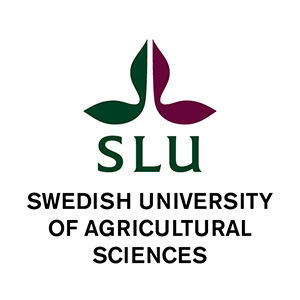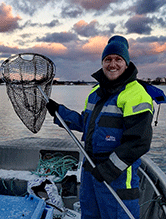Swedish University of Agricultural Sciences (SLU)
About SLU
SLU is a leading international university providing research, education and environmental assessment within the sciences for sustainable life.
Its principal sites are in Alnarp, Umeå and Uppsala, but activities are also conducted at research stations, experimental parks and educational establishments throughout Sweden.
The vision of SLU is to bring people together who have different perspectives, but a common goal: creating the best conditions for a sustainable, thriving and better world.

People
Dr. Albin Gräns at the Department of Animal Environment and Health, Swedish University of Agricultural Sciences (SLU), is an international authority on cardioventilatory physiology and non-invasive methodologies for measuring physiological and physical performance in fish. He leads the fish welfare group at SLU. In his research, Albin Gräns uses a diverse range of multi-disciplinary approaches and cutting-edge techniques to evaluate the effects of anthropogenic and/or environmental stressors on the physiology, health and welfare of fish.
His three key research areas are:
- The welfare of fish at the time of stunning and slaughter
Albin Gräns' research team and developed a technique that non-invasively registers brain activity (EEG) in fish, which allows the evaluation and optimization of different stunning methods to ensure humane slaughter. Besides the above mentioned application of our technique have been used to: 1) develop anesthesia protocols for a number of commonly used fish species for different research purposes such as laboratory experiments, environmental monitoring and aquaculture and 2) develop protocols for humane on-board slaughter of fish caught in pelagic fisheries.
- Physiological assessments for improved welfare of farmed fish
Here Albin Gräns uses his experience with state-of-the-art methodologies that allow me to remotely quantify behavioral and physiological stress responses of freely swimming fish to determine, as well as compare, how common and novel fish farm practices impacts fish welfare. In addition, we use out knowledge in determining preferences and resiliencies of fishes when faced with environmental challenges (i.e. changes in temperature, pH and salinity) and anthropogenic stressors to assess the welfare of different fish species in various rearing environments.
- Prevention of heart disease in farmed fish
Every year millions of farmed salmonids die prior to slaughter and our findings indicate that one common cause of death is from heart failure due to heart disease. Here we develop novel technologies and control systems that use machine learning to continuously survey data regarding the abovementioned risk factors, as well as operational and environmental conditions, to identify causes behind heart disease and mortality in farmed salmonids. In addition, we will develop on-site tools to evaluate mortality risk prior to stressful operational practices on fish farms.
